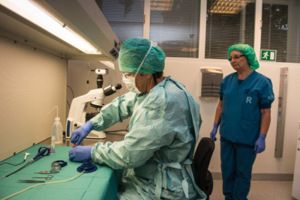News
Denmark a self-sufficient cornea donor nation
This article is more than 9 years old.
Imports for nation’s most common transplantation no longer required

Domestic supply is finally more than meets the eye demands (photo: Danish Cornea Bank)
Thanks to closer co-operation between hospitals regarding cornea donations from the deceased, Denmark no longer needs to import corneas from other nations.
It is the first time ever that Denmark has become self-sufficient for what is the most common transplantation in the country – involving the transparent layer that makes up the front part of the eye.
“Since last year, we have completely covered our need for corneas from deceased Danish patients,” Professor Jesper Hjortdal, the medical head at the Danish Cornea Bank in Aarhus – the only one of its kind in Denmark – told Metroxpress newspaper.
“We’re pleased as it shows we have a modern health system in which it is possible to co-operate and co-ordinate closely. And the previous expenses associated with importing corneas from abroad can now benefit our own system.”
READ MORE: Doctors fear for blood supply following screening cut proposal
Eyeing progress
As a result of accidents or illness, about 600 cornea transplantations are performed in Denmark on an annual basis, and previously Denmark was forced to import many of the corneas required from the US in particular.
The Danish Cornea Bank has been working to become self-sufficient for about a decade now, but really intensified its efforts in 2013 by getting more hospitals from across the nation to contribute.






































